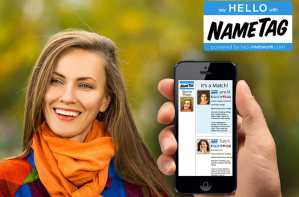
At the Privacy Identity Innovation (Pii) Conference, held over three days last week in Palo Alto, California, there was a great deal of discussion over the need for new tools to protect online users from government or hacker intrusion. Conference attendees were treated to appearances and demos by the makers of innovative products in this space, despite concerns that some of these new tools may violate privacy boundaries as well.
An example of this can be found in FacialNetwork, the Las Vegas-based developer of NameTag - a software tool released earlier this year that uses Google Glass to spot a face and compare it instantly to millions of records stored on the Internet. It then returns a match with a name, additional photos of the individual, and their social media profiles.
"Often we were interacting with people blindly or not interacting at all," said Kevin Alan Tussy, the tool's creator. "NameTag on Google Glass can change all that."
However, the new tool prompted a letter from Senator Al Franken (D-Minn.), who chairs the Senate Judiciary Subcommittee on Privacy, Technology and the Law. Franken called on Tussy to only identify people who have given the app permission to do so.
Tussy's company has countered that their app can be used by women to scan photos of potential dates against records showing people with criminal histories.
Another controversial new tool is Secret, a free iOS and Android app that is a social network for those who prefer to post their thoughts and opinions anonymously. In a joint appearance at Pii last week, the creators of Secret defended their network. "Anonymity for us simply means without a name," said Secret's David Byttow. "Why does it matter who said it versus what was said?"
His co-creator Chrys Bader acknowledged that their app has become a "very polarizing product" because it operates without requiring any public attribution. To avoid lawsuits from major public figures, the site no longer allows any posting of names, especially if they involve public figures in the news.
The company recently attracted a great deal of attention when Recode published a first-person account of a dinner in Oakland, California organized through Secret users who had never previously met each other or even knew who each other was, a social event trend that has become increasingly popular on the site.
Although these two technologies drew a lot of interest, there were others which provide a straightforward way to limit online snooping. For those seeking to limit their Internet exposure there is Disconnect, security software created by a group of former Google engineers, which "tracks the trackers." The tool gives users the ability to see who is monitoring your search, browsing and app activity, and then allows you to block tracking requests.
Last week's conference also featured a demo of StartMail, a fully private email service that uses PGP encryption. According to co-founder Dr. Katherine Albrecht, she created StartMail "because email really is a privacy nightmare."
Albrecht pointed out that although there are plenty of free email services on the market today, the companies which provide them keep copies of messages and attachments on their servers for a long time. StartMail messages are "gone forever" once they are deleted by the user. The company charges $60 per year for their service.
A number of speakers commented on how the Edward Snowden revelations about spying by the NSA on citizens in the U.S. and elsewhere in the world, has resulted in a significantly higher level of personal interest when it comes to online privacy. "I think that Snowden did us a huge favor by bringing this up and raising awareness among consumers," said Anne Toth, Vice President of Compliance for Slack. The growing number of privacy tools demonstrated and discussed at length last week is confirmation that many companies see that as a real business opportunity as well.







